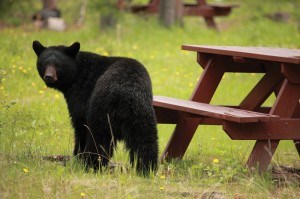
Park Wardens dealt with many incidents during the busiest weekend of the year. They issued tickets for open liquor at Horseshoe Lake and investigated a large party in one of the campgrounds, and they also dealt with wildlife related incidents.
Campers in both Kerkeslin and Wabasso campgrounds were charged with leaving wildlife attractants out in their campsites. In one case, a black bear got into unattended coolers early in the morning. Parks Canada Resource Conservation Officers hazed the bear out of the campground at that time, however by getting into a cooler that bear received a food reward. Remember that any food and garbage left out are attractants to bears, increasing the likelihood of bear/human conflicts, with the potential of injury to visitors or the destruction of a bear.
When camping in a national park:
- Anything that has an odour or could be considered food may attract wildlife to your site. When people leave their food out, bears and other species can lose their fear of humans. Once an animal gets used to human food, it becomes a risk to visitor safety, and may be destroyed. By keeping a “bare” campsite, you are playing an important part in preventing the creation of problem animals.
- Store all-food and food-related items, including coolers, dishes/pots, utensils, pet food/bowls, any garbage, bottles/cans, etc. in a hard-sided vehicle/trailer/motor home or in the campground food storage lockers (not in a tent or tent-trailer) when not in use, while you are sleeping, or when your site is unattended for any length of time.
- Keep a clean campsite. All litter and garbage must be disposed of in the bear-proof garbage bins provided.
- Carefully supervise small children when they are playing outdoors.
- Keep your dog on a leash. Don’t leave pets unattended outside.
- Carry bear spray.
Living in a National Park:
Jasper’s local residents and businesses also play an important role in managing potential bear attractants. These include grease bins, compost, recycling, garbage, fruit trees, ornamental berry bushes and even bird feeders.
- Use bear-proof garbage, grease and recycling containers at all times. Ensure they are closed properly and securely latched at all times.
- Keep garbage, grease and recycling containers clean at all times. Check for spills and leaks daily.
- Store compost bins indoors.
- Keep kitchen doors closed.
- Trim or pick fruit off trees when necessary.
If a bear discovers these unnatural food sources and becomes food-conditioned, it becomes a safety risk. By understanding bears and their behaviour and taking care not to attract them into town with potential food rewards, visitors and residents can help keep bears wild and alive.
